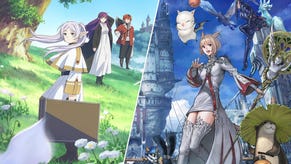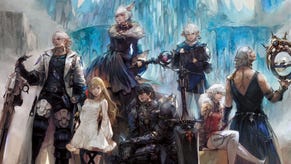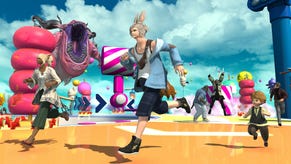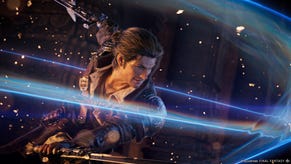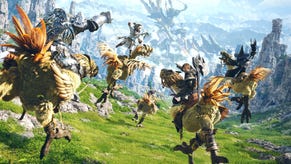From the ashes: FF14’s director on failure & redemption
Final Fantasy 14: A Realm Reborn will launch on PC and PS3 later this year. Director Naoki Yoshida sat down with Alex Donaldson to discuss the highs and lows of revamping the troubled MMO.
I’ve interviewed a lot of Japanese developers over the years – but few are as full of energy and enthusiasm as Square Enix’s Naoki Yoshida, the man given the undesirable task of trying to turn around one of the company’s biggest-budget, highest-profile failures, one only really eclipsed by the disaster that was 2001’s ill-fated Final Fantasy movie.
He’s a delight. Final Fantasy developers in particular, I’ve found, have a tendency to be slightly disconnected and flippant about the interview process while promoting their games. Not Yoshida. Questions that would get a raised brow and a half-answer from other developers I’ve spoken to are answered candidly and honestly, even when they cut close to the line of what I know he may be comfortable talking about, especially regarding his game’s chequered history. He makes my job easy.
“I took over the project on the December 20,2010 – but before then when the game was launched, even within Square Enix itself there was a concern.”
We meet again on the British leg of Final Fantasy 14: A Realm Reborn’s latest press tour, and he looks energetic despite what he later tells me has been a gruelling thirty hours of interviews all over the world in the space of a week. He’s tapping his feet, his hands drumming along to his game’s big-band take on the famous Chocobo theme, which is piped through the speaker system in Square Enix’s London headquarters.
Yoshida has reason to happily drum away into his lap – the worst of his task is pretty much over. He took over from FF11 and FF14 producer Hiromichi Tanaka in December 2010, just months after the game’s original, disastrous launch. The game was poorly and sometimes simply lazily designed. An unknown compared to many of Square Enix’s more famous creators, Yoshida was thrust into the spotlight.
It’s clear that Square Enix believe he’s done a good job. I’ve interviewed him before, and when I’m ushered into the meeting room where Yoshida has spent most of his day, he excitedly stands to pass me a business card. We’ve traded before, but he’s keen to point something out. “New job title!” he excitedly enthuses in English – upgraded from a Producer to a Corporate Executive.
With the game now playable in its all-new state and with a beta primed to launch, I ask Yoshida to take us back – and through some of the process of the last two years.
“I took over the project on the December 20,2010 – but before then when the game was launched, even within Square Enix itself there was a concern,” he admits. “Some people from the dev team and the tech team were talking, and I myself was in that group – we were really aware of the situation. We were talking about it, trying to sort of consider and have consultation on it.”
Issues with FF14’s original bug-ridden release were spreading like wildfire through the web. Screengrabs exposed how much of the game’s geometry had been copy-and-pasted repeatedly, servers barely worked and quest content was suspiciously threadbare. Fans were angry, and the game’s metacritic score sat just below 50 – a rather generous score, in truth.
It wasn’t just the development team – Square Enix was shaken to its very core.
“The company as it is was aware of the situation, and so they thought that everyone really needed to be behind this project so it would all come together,” Yoshida says, recalling when he was asked to take on the job. “So when I received the offer – when I took the call – I was kind of prepared. I was ready to accept it – I had my mind made up already.”
But did the project scare him? This is the kind of thing, I argue, that could make or break him – if his remake is successful, he’ll be a hero to the company. If it isn’t, it could kill the momentum of his career in an instant.
“At that point I had already made up my mind,” he replies. No fear. “That being said, when I actually played it – that was shocking. That’s something that I share with the players.”
I’m surprised, really, to hear Yoshida openly admit that the original release was shocking. It was far from the mark of quality Square Enix hopes the Final Fantasy series represents – so how did it pass through the many layers of the company the title needed to, plus a very rough public beta, to see a release in that state?
“We lost the players’ trust, and also, there were still people who had hope in it, and were supporting it. If we'd made the decision to shut down, that would really mean the end of the Final Fantasy series. We just couldn’t do that.”
“This is my personal point of view after taking over the project and looking into everything – these are the two elements I came to,” Yoshida says, pausing for several moments, clearly considering how he phrases an appraisal of his colleague’s work carefully.
“The first thing is that in those days I feel that we were too comfortable with the Final Fantasy name and taking for granted our fans and our players. We thought, ‘as long as it has Final Fantasy in the title, even in that state, if we update the game, players will continue to play.’
The second point is perhaps because Final Fantasy 11 was so successful, maybe that affected it in a bad way,” he muses. “In the time FF14 was released, we were not aware of how the MMO market had evolved. What’s the standard? What kinds of MMOs are out there? We had forgotten the spirit of the challenge to study and learn from our competitors. That kind of knowledge, and having a real measurement and understanding, was lacking. That’s what I feel.”
The process of patching is natural, especially in the modern age and within the MMO genre, but the problem with FF14 was scale. The game was either broken, bad or both in almost every area – the rot went deep. What I play at the press event is unrecognizable as that game, a new, clearly lovingly-crafted experience whose only flaw is being perhaps a little bit too ‘MMO by numbers’ for its own good. The process of rebooting and reaching the decision to take that massive step was a complicated one, Yoshida explains.
“First of all, there were a few bits it was obvious we needed to fix straight away. One of them was the server, back-end systems – it had to be stable. Secondly, the user interface – that was just not acceptable, so that’s just something we really had to improve to another degree.
“So, those two were already decided – that was something that was obvious to me and I’d already made up my mind on those two points. I told the team to fix those two straight away. In the meantime, I started to sort of think about the game design, because the game design of the 1.0 version was just not making sense – it was not acceptable, again.
“Final Fantasy has a 25 year history, and the reason we’ve managed to come so far is because we always excited the players. However, what happened with 14 – that was a huge damage to the Final Fantasy franchise.”
“I was starting to define what kind of game this is going to be – this new version I’m going to do. While I was also doing the game design, I also asked the team to look into the game engine, the server system... we had to do more research to understand how the structure was built at that point.”
It speaks to how aware Square Enix are of how problematic FF14’s original release is and how important A Realm Reborn is that Yoshida is given license to talk so freely about the original, failed release. PR doesn’t even flinch. There’s a pause from Yoshida, who is a fast-answering interviewee but seems unafraid to stop and consider his phrasing.
“The most dangerous thing that could happen in that kind of situation is a panic, without anyone knowing what we’re going to do,” he says.
Yoshida isn’t just a smart-minded designer, but also a good manager of a team, it seems.
“We needed to have a clear goal, a clear aim of what we were going to go towards. Setting a goal was very, very important – what to do, and also how to do. That was something I worked hard on.”
“After around a month, I came up with my goal for the game design. The tech team also finished their research of the server-side and the game engine. We combined the two, asking if with this kind of technology, we could get to the game design that we’ve created. There was just no way we could meet the target without redoing the game. We came to that conclusion.”
The criterion was set, and thus began the development of Final Fantasy 14: A Realm Reborn. Square Enix are keen to point out that they see this as a first in the genre, the first time an MMO has been completely rebuilt from the ground up – a new world, new gameplay systems, even completely rethought visuals.
Playing the game, it is rather impressive just how much has changed. Locations, items and other such concepts share the same names as before, and there is a plot link to the previous iteration, but this is quite literally a whole new game. In my time with it, it feels a competent MMO draped in as much FF fan service as could be crammed in, from musical nods through to little hints in dialogue and major elements of the game world and story.
Those facts beg another question, though – why do this? Many companies would be happy to simply sweep such a release under the rug and move on. Why not just keep moving, and plough resources into another new title in the series? A rebuild is an expensive proposition, especially for a game many may ignore on word of mouth alone.
“Final Fantasy has a 25 year history, and the reason we’ve managed to come so far is because we always excited the players,” Yoshida says. “They always got excited with each numbered title, and therefore they looked forward to the next title and wanted it to come out as soon as possible. However, what happened with 14 – the big failure and the mistake we made – that was a huge damage to the Final Fantasy franchise.”
“We lost the players’ trust, and also, there were still people who had hope in it, and were supporting it. If we made the decision that we were going to shut down, considering some people purchased a large PC, high spec PCs and were still looking forward to the future, that would really mean the end of the Final Fantasy series. We just couldn’t do that.”
“We wouldn’t be able to bring the next number out until we regain the trust of our players. That’s something I really felt, and the company also agreed. We decided to retry with this numbered title and make sure we really regain our users’ trust. I know this sounds crazy, but that is the reason.”
While we have been updating the 1.0 version, we really started to get more and more positive feedback from the players. We’ve even had people even saying the 1.0 version is great fun these days. I really feel there is a very high expectation.”
For better or for worse, Yoshida and his team are about to face the judgment of the general public. I ask him how he’s feeling to see two years of work and the potential future of the Final Fantasy franchise finally be placed into the public’s hands, first with a closed beta this month and then with a full release later this year.
“Well, actually, I’ve been too busy to think about it,” he admits, vocalizing a loud ‘hmm’ as he thinks.
“That being said, while we have been updating the 1.0 version, we really started to get more and more positive feedback from the players. We’ve even had people even saying the 1.0 version is great fun these days. Especially towards the end, a lot of people said it was very exciting, and also people like you, the media, have been giving great support. I really feel there is a very high expectation, so... that’s something that I definitely feel.”
Would he do it all again? He hopes that A Realm Reborn is of a high enough quality that he won’t have to. “I’ve had enough!” he laughs. “I really don’t want to have to do it again!”
Final Fantasy 14: A Realm Reborn is currently in closed beta on PC. Phase 3 of the beta will see the beta go public and PS3 users will be able to join on the action.
Both versions will be released later this year.





